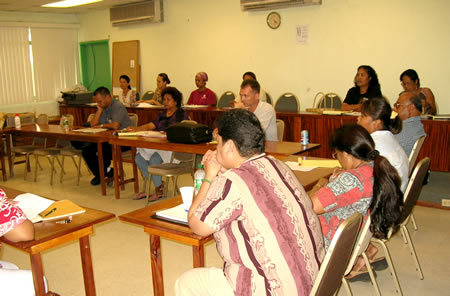
SamoaMA 2019
Master of Arts in Education - Postsecondary Educational Leadership

This program is presented in collaboration with the American Samoa Department of Education, the Center for Pacific Studies at the SDSU Interwork Institute, the Department of Administration, Rehabilitation, and Postsecondary Education (ARPE) within the College of Education (COE) at SDSU.
Program
- This program is intended for Education and Human Services Professionals desiring to earn a graduate degree focusing on leadership and administration.
- Program content is specifically selected and delivered to meet local needs.
- The program is designed to accommodate the working adult. Instruction is provided both locally and online employing multiple instructional modalities.
The types of professionals who have benefited from this program of study leading to a Master of Arts degree previously include:
- Administrators of Education Programs
- Teachers
- College Administrators and Instructors
- Ministry of Education Personnel
- Human Services Agency Administrators
- Private Business Leaders and Elected Officials
MA Degree
- Prepares candidates to function as effective leaders.
- Includes students from diverse educational and human services organizations.
- Is recognized nationally and internationally.
Program Learning Outcomes (PLOs)
- Articulate the theoretical foundation of leadership in postsecondary education and administration. (PLO 1)
- Identify how learning and development theories can be implemented in daily practice within postsecondary education and administration. (PLO 2)
- Identify what educational preparation and learning strategies learners need to be successful (PLO 3)
- Identify and apply varying leadership styles that are prevalent within a postsecondary and/or administrative context. (PLO 4)
- Identify one's own leadership strengths and identify areas of continued development. (PLO 5)
- Identify ethical leadership issues in postsecondary education and propose solutions and strategies to address these issues. (PLO 6)
- Engage in meaningful outcomes-based assessment of collaboratively designed student learning and development programs and initiatives. (PLO 7)
- Articulate and apply the foundational principles of access, equity, and learner success. (PLO 8)
- Apply research to practice in an area of specialization within postsecondary education. (PLO 9)
- Communicate ideas and concepts effectively in written and spoken word. (PLO 10)

